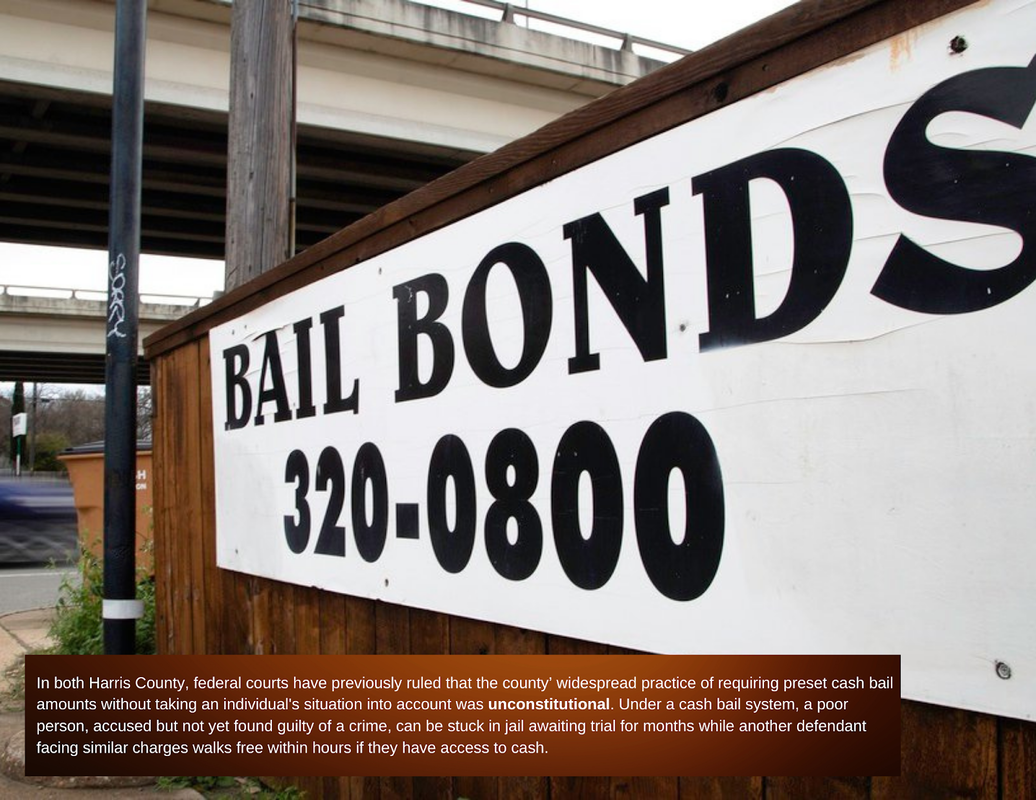|
Was this judge also a lawyer?¹ I had a feeling he wasn’t. I’d heard him before I saw him perched upon the bench — but I’d grown up around hogs, so I knew how people screamed at animals. I leaned against the wall and followed the herd ahead of me. The amounts that I’d overheard given for bail were outrageous — I wondered if I could talk to this guy? As I took in the small courtroom, noticing the team of clerks and such, I couldn’t help but consider that I probably needed a lawyer for this part.² I asked a woman across the plexiglass if I could talk to one, and she in a rehearsed response, replied I would have to “see the judge first”. Have you ever felt unprepared? Imagine it being on the merits of your release or your staying put -- The letter in my last name being towards the end, I wasn’t called until many, including Spanish-speaking folks who I thought were grossly unprepared, had gone before me receiving astronomical numbers. I stood up at my turn and digested the short conversation regarding me: “…blah, blah…bail is set at one-hundred (100) thousand dollars, cash bond only.” I swallowed whatever guilt and innocence I ever had and raised my hand. I took them by surprise, but was acknowledged and asked to speak: “Judge, bail is defined as to not be so used as an instrument of oppression.³ I haven’t earned over $30k in the last four years, and there’s absolutely no way for me to achieve a $10k premium for my release, even in the longest of weeks. I’d like to request that the 8th Amendment be considered and applied in my case, being that the US Constitution is the only authority your decision is subject to.” [Article 17.15, Texas Code of Criminal Procedure]³
The judge lowered his glasses and replied: “Mr. Watson, I can tell you’re a smart guy. You speak to strong grounds and although I have my concerns — you have your rights. Bail is hereby set @ sixteen (16) thousand dollars, cash or surety bond negotiated pro se by the defendant. Good luck to you sir.” I called home and told my lady that all I needed out of the account was $225 and I could be released today. A week after we’d paid rent, we didn’t quite have the full amount. She gave the bailbondsman my last $175 and a TV we kept in the back room. When she picked me up on the last tank of gas we had, she expressed to me how filthy she considered the entire experience to be. You may think someone guilty of the worst crime deserves the worst punishment, but everyone accused of a crime deserves a reasonable assurance that their undertaking “shall be complied with”,³ on grounds of the 8th Amendment clause against excessive bails and cruel and unusual punishments,* as well as the affirmations of Article 17.15 of the Texas Code of Criminal Procedure.³ The American cash bail system exists to ensure one’s incarceration during the pre-trial process and make it impossible to gain one’s release. Due to the nature of the charge being the bias upon a bail decision, consider those who are arrested and innocent? Is this an experience you would wish on even your adversary? Police in America make 10 million arrests per year,^^ cultivating a repository of bail-driven funds, based on the rate therein and comprehensive gain thereof in housing inmates [In 2020, Texas property taxpayers spent $30-33k to lodge an inmate in a jail/prison]. It’s never more crime that provokes fear into the community; studies show that’s it truly and always, more arrests aggressively promoted by the media outlets across regions in America.. Studies have proven the benefit of a criminal defendant’s first impression with a judge when received with counsel present,^ is incomparably different than when a defendant is without one. How does the court know what someone can afford as bail, with no examination or analysis of their own testimony to the facts of their financial status altogether? An examining trial, granted to Texans in both the US Constitution and Texas Code of Criminal Procedure, is an opportunity for a defendant to confront and cross-examine his or her accuser (granted in the 6th Amendment)* but also argue bail and conditions. However, it is often ignored during pre-trial, pre-indictment phases of the court process. Under the presumption of innocence* granted to defendants in all levels of civil, criminal, and international law, proof is a heavy burden for the one who attests the offense, but not with he who denies the claim. Bail amounts set today have decided the fate and guilt simultaneously of people arrested, often before a defendant discusses anything with a lawyer or has his “day in court”. Land of the free and home of the brave? After everything I’ve seen as a Black man in America, this place is only the land of the fees and home of the slave — the harmonica hums, so the tunes continue as it is. Written by: Chivas Watson Helpful Links:
1 Comment
3/27/2024 05:15:37 am
The title "Bail: A Harmonica of Oppressive Tunes" immediately grabs attention, suggesting a nuanced exploration of the complexities surrounding the bail system. This evocative metaphor hints at the discordant realities faced by individuals caught within its confines, highlighting the potential for injustice and inequity inherent in the current bail framework. By framing bail as a harmonica playing oppressive tunes, the author likely delves into the societal implications of bail practices, touching upon themes of socioeconomic disparity, racial bias, and the erosion of presumption of innocence. Such critical examinations are crucial for fostering dialogue and driving systemic change within the criminal justice system, making this blog post a thought-provoking contribution to the ongoing discourse surrounding bail reform and social justice.
Reply
Leave a Reply. |
AuthorWrite something about yourself. No need to be fancy, just an overview. Archives
June 2024
Categories |
|
|
About UsPure Justice uses community organizing, and civic and electoral engagement as methods help reform institutions and systems that perpetuate social and criminal injustices, and to improve the lives of low-income and working-class families
|
Get In TouchMailing Address
Pure Justice 5380 W. 34th St. 305, Houston, TX, 77092, United States Community Space Address (No Mail Here) Pure Justice 4530 W. 34th St. Suite J, Houston, TX, 77092 (713) 370-7490 [email protected] |
© Pure Justice. All rights reserved.



 RSS Feed
RSS Feed